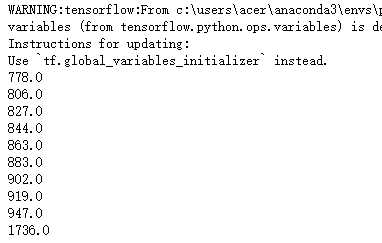标签:shape with tar close sep constant art data adl
import tensorflow as tf q = tf.FIFOQueue(1000,"float32") counter = tf.Variable(0.0) add_op = tf.assign_add(counter, tf.constant(1.0)) enqueueData_op = q.enqueue(counter) sess = tf.Session() qr = tf.train.QueueRunner(q, enqueue_ops=[add_op, enqueueData_op] * 2) sess.run(tf.initialize_all_variables()) enqueue_threads = qr.create_threads(sess, start=True) coord = tf.train.Coordinator() enqueue_threads = qr.create_threads(sess, coord = coord,start=True) for i in range(0, 10): print(sess.run(q.dequeue())) coord.request_stop() coord.join(enqueue_threads)

import os path = ‘F:\\lj\\aa\\VOCdevkit\\VOC2012\\JPEGImages\\‘ filenames=os.listdir(path) strText = "" with open("E:\\train_list.csv", "w") as fid: for a in range(len(filenames)): strText = path+filenames[a] + "," + filenames[a].split(‘_‘)[0] + "\n" fid.write(strText) fid.close()
import cv2 import tensorflow as tf image_add_list = [] image_label_list = [] with open("E:\\train_list.csv") as fid: for image in fid.readlines(): image_add_list.append(image.strip().split(",")[0]) image_label_list.append(image.strip().split(",")[1]) img=tf.image.convert_image_dtype(tf.image.decode_jpeg(tf.read_file(‘F:\\lj\\aa\\VOCdevkit\\VOC2012\\JPEGImages\\2007_000250.jpg‘),channels=1),dtype=tf.float32) print(img)

import cv2 import tensorflow as tf image_add_list = [] image_label_list = [] with open("E:\\train_list.csv") as fid: for image in fid.readlines(): image_add_list.append(image.strip().split(",")[0]) image_label_list.append(image.strip().split(",")[1]) def get_image(image_path): return tf.image.convert_image_dtype(tf.image.decode_jpeg(tf.read_file(image_path), channels=1),dtype=tf.uint8) img = tf.image.convert_image_dtype(tf.image.decode_jpeg(tf.read_file(‘F:\\lj\\aa\\VOCdevkit\\VOC2012\\JPEGImages\\2007_000250.jpg‘), channels=1),dtype=tf.float32) with tf.Session() as sess: cv2Img = sess.run(img) img2 = cv2.resize(cv2Img, (200,200)) cv2.imshow(‘image‘, img2) cv2.waitKey(0)
import numpy as np import tensorflow as tf a_data = 0.834 b_data = [17] c_data = np.array([[0,1,2],[3,4,5]]) c = c_data.astype(np.uint8) c_raw = c.tostring() #转化成字符串 example = tf.train.Example( features=tf.train.Features( feature={ ‘a‘: tf.train.Feature(float_list=tf.train.FloatList(value=[a_data])), ‘b‘: tf.train.Feature(int64_list=tf.train.Int64List(value=b_data)), ‘c‘: tf.train.Feature(bytes_list=tf.train.BytesList(value=[c_raw])) } ) )
import numpy as np import tensorflow as tf writer = tf.python_io.TFRecordWriter("E:\\trainArray.tfrecords") for _ in range(100): randomArray = np.random.random((1,3)) array_raw = randomArray.tobytes() example = tf.train.Example(features=tf.train.Features(feature={ "label": tf.train.Feature(int64_list=tf.train.Int64List(value=[0])), ‘img_raw‘: tf.train.Feature(bytes_list=tf.train.BytesList(value=[array_raw])) })) writer.write(example.SerializeToString()) writer.close()
import os import tensorflow as tf from PIL import Image path = "E:\\tupian" filenames=os.listdir(path) writer = tf.python_io.TFRecordWriter("E:\\train.tfrecords") for name in filenames: class_path = path + os.sep + name for img_name in os.listdir(class_path): img_path = class_path+os.sep+img_name img = Image.open(img_path) img = img.resize((500,500)) img_raw = img.tobytes() example = tf.train.Example(features=tf.train.Features(feature={ "label": tf.train.Feature(int64_list=tf.train.Int64List(value=[int(name.split("_")[0])])), ‘image‘: tf.train.Feature(bytes_list=tf.train.BytesList(value=[img_raw])) })) writer.write(example.SerializeToString())
import cv2 import tensorflow as tf filename = "E:\\train.tfrecords" filename_queue = tf.train.string_input_producer([filename]) reader = tf.TFRecordReader() _, serialized_example = reader.read(filename_queue) #返回文件名和文件 features = tf.parse_single_example(serialized_example, features={ ‘label‘: tf.FixedLenFeature([], tf.int64), ‘image‘ : tf.FixedLenFeature([], tf.string), }) img = tf.decode_raw(features[‘image‘], tf.uint8) img = tf.reshape(img, [300, 300,3]) img = tf.cast(img, tf.float32) * (1. / 128) - 0.5 label = tf.cast(features[‘label‘], tf.int32)
import cv2 import tensorflow as tf filename = "E:\\train.tfrecords" filename_queue = tf.train.string_input_producer([filename]) reader = tf.TFRecordReader() _, serialized_example = reader.read(filename_queue) #返回文件名和文件 features = tf.parse_single_example(serialized_example, features={ ‘label‘: tf.FixedLenFeature([], tf.int64), ‘image‘ : tf.FixedLenFeature([], tf.string), }) img = tf.decode_raw(features[‘image‘], tf.uint8) img = tf.reshape(img, [300, 300,3]) sess = tf.Session() init = tf.initialize_all_variables() sess.run(init) threads = tf.train.start_queue_runners(sess=sess) img = tf.cast(img, tf.float32) * (1. / 128) - 0.5 label = tf.cast(features[‘label‘], tf.int32) print(img) # imgcv2 = sess.run(img) # cv2.imshow("cool",imgcv2) # cv2.waitKey(0)
import cv2 import tensorflow as tf filename = "E:\\train.tfrecords" def read_and_decode(filename): filename_queue = tf.train.string_input_producer([filename]) reader = tf.TFRecordReader() _, serialized_example = reader.read(filename_queue) #返回文件名和文件 features = tf.parse_single_example(serialized_example, features={ ‘label‘: tf.FixedLenFeature([], tf.int64), ‘image‘ : tf.FixedLenFeature([], tf.string), }) img = tf.decode_raw(features[‘image‘], tf.uint8) img = tf.reshape(img, [300, 300,3]) img = tf.cast(img, tf.float32) * (1. / 128) - 0.5 label = tf.cast(features[‘label‘], tf.int32) return img,label img,label = read_and_decode(filename) img_batch,label_batch = tf.train.shuffle_batch([img,label],batch_size=1,capacity=10,min_after_dequeue=1) init = tf.initialize_all_variables() sess = tf.Session() sess.run(init) threads = tf.train.start_queue_runners(sess=sess) for _ in range(10): val = sess.run(img_batch) label = sess.run(label_batch) val.resize((300,300,3)) cv2.imshow("cool",val) cv2.waitKey() print(label)
标签:shape with tar close sep constant art data adl
原文地址:https://www.cnblogs.com/tszr/p/10358651.html